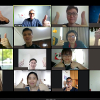Blog
Leaders need many qualities to be successful, particularly as they lead and engage their teams remotely and that Working From Home looks like it’s here to stay.
Being a good listener comes near the top of that list of qualities, because it has such a positive impact on the relationship with your teams and stakeholders.
Good listening helps you to truly understand the thoughts and ideas of others and shows that you really care about their point of view. It encourages people to explore and helps both of you get new perspectives on the issue.
Listening is what builds connections, creates trustful relationships and leads to engaged and motivated teams.
So if good listening is a must-have leadership skill, how can listening help generate higher levels of engagement?
Some think the combination of listening and higher engagement is counter-intuitive — if you want to engage your team more, then you need to talk more, right?
But think about it: If you want your team member to interact & work with you more, then someone will have to listen to what they have to say, and that someone is you.
The challenge is that listening is easier said than done. So we’ve condensed 3 simple steps you can take to become a great listener, and eventually a driver of team engagement.
1/ Be present in the conversation.
Be present, curious and totally focused...
This is tough to do, but it’s an essential part of good listening. If you are distracted or doing something else, this sends the wrong signals and just doesn’t work!
You know how irritating it is when someone is not listening. You can spot it within a few moments of the start of a conversation, whether it is on a Zoom call, on the phone or face to face. People feel ignored, disrespected and feel like giving up when this happens. The conversation loses energy and the relationship drifts apart over time. Sound familiar?
It comes down to being curious… You have to be really interested and available to listen; even 5 minutes of your undivided attention is way better than 10 minutes of non-listening. Be open to understand what the other person has to say, even if you don’t agree with them.
Nothing less than 100% presence and focus will do.
2/ Talk less and listen more.
Let the other person talk and allow them to explore their thoughts……
Letting people talk is a core coaching skill that helps people to get clarity on whatever situation you are discussing. Your listening attitude will help them to feel comfortable telling you what's on their mind and often new perspectives and insights emerge when you do this.
Don’t interrupt, because it interferes with the person’s thought process. Interrupting directs the conversation the way you want it, not necessarily the way it should go. Really listen to what they are saying and feeling, as this will open up new information for you to build on.
3/ Reformulate and dig deeper
Check out your understanding of what’s being said…
Reformulation doesn’t have to be mechanical. It can be as simple as “can I just check what I have understood….” or “what you are saying is that…” or "you sound frustrated by that..."
If you make it part of the of the natural flow of your conversation, it tells the other person you are really listening and opens up the dialogue.
When you reformulate accurately, it gives new energy to the conversation and the alignment brings the discussion to a new level. It’s a great feeling when someone accurately summarizes in their words what you really meant.
If you get your reformulation wrong, it’s not a problem. A mismatch in understanding is often helpful to both of you, because sometimes things are said in a conversation that aren't that clear. Probing this in a constructive way shows that you have an open mind and allows you to backtrack, clarify what you are hearing and then move on.
It’s really powerful!
Bonus: Ask open questions
Get them to present their viewpoint and tell their story
And lastly, good questioning goes hand in hand with good listening. Use open, neutral questions that get people talking, avoid the temptation to ask closed ones, load your questions with inferences or close down the conversation with yes or no answers.
So good listening is key to leading teams remotely, but it needs practice to improve, just like any other skill.
The payback comes when you gain a new level of understanding with your teams and stakeholders, an understanding that builds trustful relationships, high engagement and great performance.
Have you worked with leaders who have made you feel heard?
And since we’ve all gone digital, are there any new challenges in communication you’ve encountered? Perhaps you’ve also discovered something new about the way your team communicates?
I’m excited to hear about your experience below!
If you’ve found this article interesting, be sure to drop the TYC page a follow to get the newest resources, articles and updates on our upcoming webinars.
Don Rapley is a Leadership & Team Development Facilitator and the Managing Director of TYC (Transform Your Conversations), a leadership development organization focusing on empowering leaders with the skills to have better, more effective conversations with their teams. He lives in Singapore.










